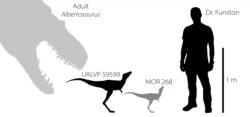For the first time, scientists have found the remains of babies from the group of meat-eating dinosaurs that includes Tyrannosaurus rex.
Researchers said recently that the jaw and claw bones show that the large babies looked a lot like adults and were “born ready” to hunt.
The bones, also called fossils, represented two species from the group called tyrannosaurs. Tyrannosaurs were the top hunters in Asia and North America toward the end of the dinosaur age.
The bones suggested that these babies were bigger than any other known dinosaur babies. They were probably around one meter long. They came from what must have been very large eggs, perhaps larger than the largest dinosaur eggs currently known, which are about 43 centimeters.
The jawbone is around 77 million years old and about 3 centimeters in length. It was found in Montana and may belong to a species called Daspletosaurus.
The claw is around 72 million years old. It came from Canada and may belong to a species called Albertosaurus.
Both of these species are believed to be smaller cousins of Tyrannosaurus rex. The largest known tyrannosaurs were over 12 meters long.
Greg Funston of the University of Edinburgh was the lead writer of the research that appeared in the Canadian Journal of Earth Sciences. He said the scientists were surprised at how similar the bones were to older tyrannosaurs. Funston noted that the jaws had working teeth.
“So although we can’t get a complete picture, what we can see looks very similar to the adults,” he said.
It appears that tyrannosaurs, Funston added, were “born ready to hunt, already possessing some of the key adaptations that gave tyrannosaurs their powerful bites.”
Adaptation is a term that means a change in an animal that makes it better able to live in a particular place or situation.
Funston said it was “likely” that the baby tyrannosaurs “were capable of hunting fairly quickly after birth, but we need more fossils to tell exactly how fast that was.”
I’m John Russell.
Will Dunham reported on this story for Reuters. John Russell adapted it for VOA Learning English. Bryan Lynn was the editor.
________________________________________________________________
Words in This Story
jaw – n. either one of the two bones of the face where teeth grow
claw – n. a sharp curved part on the toe of an animal (such as a cat or bird)
species – n. biology : a group of animals or plants that are similar and can produce young animals or plants : a group of related animals or plants that is smaller than a genus
capable – adj. having the ability to do or have something






